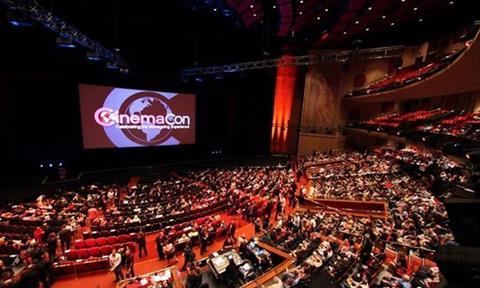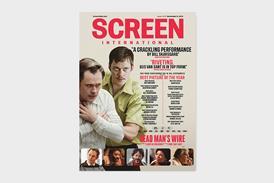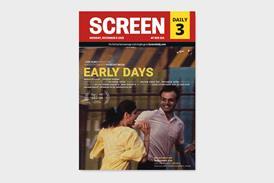
National Association Of Theatre Owners (NATO) head John Fithian told attendees on the second day of at CinemaCon on Tuesday (2) that the worlds of streaming and theatrical reinforce each other.
“Theatrical and streaming are two completely different experiences and have their time and place,” said Fithian at the Colosseum at Caesars Palace in Las Vegas. ”Streaming and theatrical don’t just coexist; they reinforce each other.”
The NATO head struck a realistic note when he addressed the future of the business. ”Success at the box office comes at a time when consumers have access to more choices at home… and the dynamic between theatrical and streaming continues to get a lot of attention.
“Large media companies are establishing direct relationships with consumers in their homes. Competition for big stars will only intensify. In this climate it’s important to ask how does any given movie stand out… A robust theatrical release provides a level of prestige to a movie that cannot be replicated.”
Fithian added, “I understand some movies will go straight to home and skip theatrical. There is nothing revolutionary about that idea. All we ask is movies be given their time to reach their full potential audience in theatres before heading to the home.”
The annual state of the industry session, introduced by Crazy Rich Asians director Jon Chu, started with upbeat comments by Motion Picture Association of America (MPAA) chief Charles Rivkin, who trumpeted 2018 box office, the ongoing fight against piracy, and noted the addition of Netflix to the body’s member companies.
“We are all stronger advocates for creativity and the entertainment business when we are working together… all of us,” Rivkin said after a brief run-through of the 2018 box office headlines: $41.1bn at the global box office, a record $11.9bn North American haul, and 5% admissions surge in North America, all of which were mentioned in the recently published THEME report.
Reflecting on his first year in the post, Rivkin said: ”I have also come back to share three valuable lessons that I learned in my first full year at the MPAA,” he said. “First, audiences are hungry for content – and they especially appreciate seeing themselves on the screen in all their diversity.
“Second, our industry knows how to put creativity to work – from our breathtaking screen stories to the investments you have made in your theaters to enhance the viewing experience. And third, audiences showed the world that the unique power of cinema not only endures, it continues to blaze bright.”
Turning to piracy he said, “As you know, piracy is a global phenomenon. And our ACE coalition, now with more than 30 global partners, is growing as we speak. In the past year, we have seen significant victories against piracy devices and services like Tickbox and Dragonbox.
”The MPAA also works with theaters and law enforcement around the world, every day to reduce piracy. Last December in London, a camcorder thief was apprehended while recording a major holiday theatrical release during its opening weekend. Our collaboration with theaters in the UK, and the City of London police, uncovered the breadth of his piracy, which included films from more than half a dozen studios.
”According to a Carnegie Mellon study, pre-release piracy can result in a 19% reduction in box office revenue for a film. That particular movie went on to make over $450 million at the worldwide box office. If that man had not been caught, that figure could have been significantly lower. And you know what that means for your bottom line.”
Rivkin reserved special praise for the work of Joan Graves, the senior vice-president and chairman of The Classification and Rating Administration (CARA) for the MPAA who steps down this spring after 30 years of service at the 50-year institution. Rivkin referred to Graves as ”someone special who had a profound impact on those ratings, the movie-going experience, and all of us.”
Cueing up a short video presentation that featured tributes from NATO chief John Fithian, former MPAA chiefs Chris Dodd and Dan Glickman, filmmaker Eli Roth and industry associates, Rivkin added that the industry regarded Graves as ” an institution. An icon who served the production and the exhibition community, but especially dedicated every day to parents and moviegoers.”
Graves temporarily stopped the show when she slipped on steps as she left the stage, only to receive an enthusiastic applause some 10 minutes later when she was escorted from the venue after receiving attention.
























No comments yet